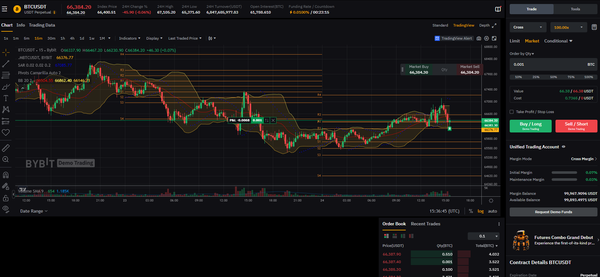Forget Grandma's House: Why Crypto Futures Might Be the New Real Estate for Everyday Investors

The booming retail investor space in cryptocurrencies has fueled the popularity of high-leverage crypto perpetual futures trading. But how does this high-octane strategy stack up against a more traditional option like real estate? This post explores the allure of crypto futures and sheds light on the limitations of real estate investing in this context. However, remember, high potential rewards often come with high risks. Always conduct thorough research and understand your risk tolerance before diving into any investment.
The Allure of Crypto Perpetual Futures Trading
- Low Barrier to Entry: Unlike real estate, which requires a hefty down payment and closing costs, crypto futures allow you to start with a smaller investment. Leverage, sometimes reaching 200x, lets you control a larger position with minimal capital. Imagine turning a $100 investment into a $10,000 position with 100x leverage! This democratizes access to the market, especially for those starting out.
- High Liquidity and Flexibility: Crypto markets never sleep, offering unmatched liquidity. You can enter and exit positions 24/7. Additionally, you can adjust your leverage based on market conditions and your risk appetite. Real estate, on the other hand, is notoriously illiquid. Selling a property can take months, and adjustments require significant financial resources.
- Rapid Profit Potential: Buckle up! The volatility of the crypto market, coupled with leverage, can lead to significant gains in a short period. A small price movement can translate into amplified profits when leveraged. This is a stark contrast to real estate, where appreciation typically happens slowly and steadily.
- Hedging and Diversification: Crypto futures offer sophisticated risk management tools. You can hedge your portfolio by taking opposite positions to protect against unfavorable market movements. Diversification is also easier, as you can spread your investment across various cryptocurrencies and leverage levels. Real estate requires substantial capital to achieve similar diversification, and each property adds complexity.
The Drawbacks of Real Estate Investing
- High Costs: Real estate comes with a hefty price tag upfront. Mortgages, down payments, and closing costs can be daunting for many. Additionally, ongoing maintenance, repairs, taxes, and insurance chip away at your returns and require active management.
- Illiquidity and Transaction Time: Selling a property is a lengthy process involving marketing, negotiations, and legalities. This lack of liquidity is a stark contrast to crypto futures, which can be liquidated instantly.
- Slower Returns and Limited Scalability: Real estate appreciates gradually, leaving those seeking quicker returns wanting. Scaling a real estate portfolio also requires significant capital and time. Crypto futures, on the other hand, allow for quicker scaling by adjusting position sizes and leverage.
- Market and Economic Dependence: Real estate values are closely tied to economic conditions, interest rates, and local market factors. A downturn can significantly impact property values. Regulations and taxes can also vary vastly by location, affecting returns. Crypto markets, while evolving, offer a more uniform landscape with fewer immediate regulatory hurdles.
Debunking the Real Estate Myth: Grandma's House Doesn't Tell the Whole Story
We've all heard the story of grandma buying a house in Brooklyn for a pittance that's now worth millions. While these anecdotes are captivating, they often overlook the rarity of such success. Exceptional property appreciation often hinges on specific factors like urban development or economic policies. Not all real estate investments yield such extraordinary returns.
Selective Success and the Power of Time
The "grandma's house" story is a classic example of survivorship bias. It focuses on the winners while ignoring the countless properties that haven't appreciated significantly. These stories often fail to account for carrying costs and potential vacancy periods, which can erode net returns.
Furthermore, inflation can make long-term real estate returns less impressive. The nominal increase in property value might not translate to significant purchasing power gains decades later. Additionally, capital tied up in real estate could potentially yield higher returns in more dynamic markets like crypto futures.
Location Matters (and Crypto Doesn't Care)
The exceptional returns on some properties are often location-specific, driven by rapid development in certain areas. Real estate markets are highly localized, and growth in one area doesn't guarantee the same in another. Crypto markets, on the other hand, offer a more universal appeal with the potential for profit regardless of geographic location.
Realistic Real Estate Expectations
Most real estate investments appreciate at a steady, moderate rate. They provide stability and potential for passive income but lack the rapid growth potential of high-leverage crypto futures. While real estate can be a solid long-term investment, its returns might not be as spectacular as some stories suggest.
Conclusion
Trading crypto perpetual futures with high leverage offers retail traders a compelling alternative to traditional investments like real estate. The low entry barrier, high liquidity, rapid profit potential, and flexibility make it an attractive option for those seeking dynamic and scalable investment opportunities.
While real estate remains a valuable long-term asset class, its high costs, illiquidity, and slower returns can be significant drawbacks compared to the fast-paced world of crypto trading. Furthermore, the often-touted exceptional returns from real estate can be overblown, failing to reflect the broader, more common experiences of typical investors.
By embracing the dynamic world of crypto futures, retail traders can access a realm of possibilities that traditional investments like real estate simply cannot match. As with any investment strategy, understanding and managing the associated risks is crucial to capitalizing on these opportunities effectively.




